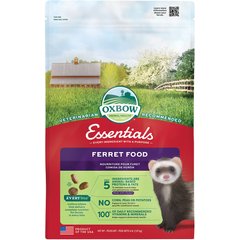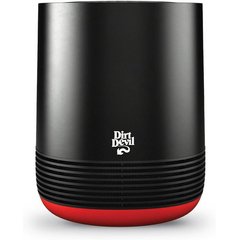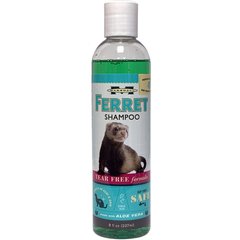Enlargement of Esophagus in Ferrets
Megaesophagus in Ferrets
Rather than a single disease entity, megaesophagus refers to dilation and slow movement of the esophagus, a muscular tube connecting the throat to the stomach. This may be a primary disorder or secondary to esophageal obstruction or neuromuscular dysfunction. If esophageal motility is decreased or absent, it can result in severe complications, including starvation and aspiration pneumonia. Megaesophagus is usually seen in adult ferrets (3-7 years old), implying that the disease is acquired.
Symptoms and Types
Regurgitation is considered the hallmark sign of megaesophagus. Also, aspiration pneumonia may develop due to the entrance of food or liquid into the lungs. Other common symptoms include:
- Vomiting
- Coughing and choking
- Nasal discharge
- Shortness of breath
- Weight loss (cachexia)
- Extreme hunger or loss of appetite (anorexia)
- Excessive drooling (ptyalism)
- Bad breath (halitosis)
Recommended Products
Causes
The acquired form of megaesphagus is commonly idiopathic (of unknown origin), but may be due to:
- Neurological and neuromuscular diseases (e.g., botulism, distemper, cancer)
- Esophageal obstruction (foreign object, stricture, tumor)
- Inflammation of esophagus
- Toxicity (e.g., lead, thallium)
Diagnosis
Your veterinarian will first ask you for a thorough history of your ferret’s health. He or she will then perform a complete physical examination on your ferret and attempt to differentiate, with your description, whether it is regurgitating or vomiting, which is important in ruling out underlying diseases that cause vomiting. The shape of expelled material, presence of undigested food, and length of time from ingestion to vomiting (or regurgitation) will also help differentiate between these two issues.
Routine laboratory tests will be performed, including a complete blood count (CBC) and urinalysis, which are usually normal in ferrets with megaesophagus. However, abnormalities related to underlying diseases or complications, like aspiration pneumonia, may be seen. Radiographic studies will show the enlarged esophagus filled with fluid, air, or food, and will help identify abnormalities related to aspiration pneumonia.
More advanced techniques, like endoscopy and biopsies may also be employed to confirm a diagnosis of megaesophagus.
Treatment
The major goal of therapy is to treat the underlying cause. However, it is also important that ferrets with compromised feed intake are meeting their daily nutritional requirements (70 kcal/kg body weight per day; more if the ferret is sick). Depending on the underlying cause of the problem, surgery may be employed. For instance, in cases of a foreign body, it will be removed immediately to provide relief and prevent further complications.
Aspiration pneumonia is another life-threatening problem that requires immediate hospitalization, where oxygen therapy, antibiotics, and other medications are used to treat the condition.
Living and Management
Follow the guidelines related to care and nutritional requirements for your ferret. Recumbent animals may require extra care; soft bedding and turning the animal every four hours is essential. If your ferret is not able to take feed, your veterinarian may pass a feeding tube directly into the stomach for feeding purposes. He or she will teach you how to properly use such equipment, though it is important to clean the tube after each use. Regular weighing of your ferret is also required to ensure it is at an adequate range (not losing too much, but not too heavy either).
For patients able to take solid food, special arrangements are required for correct feeding to prevent aspiration pneumonia. These animals are kept in an upright position for 10 to 15 minutes after eating or drinking, and both food and water bowls need to be elevated (45 to 90 degrees) from the floor.
You will need to visit your veterinarian for regular follow-ups to evaluate your ferret and treatment progress. Chest X-rays are repeated if aspiration pneumonia is suspected.
Prevention
Esophageal obstruction may be prevented by safely securing rubber toys, bones, garbage, and other choking hazards out of your ferret's reach.



